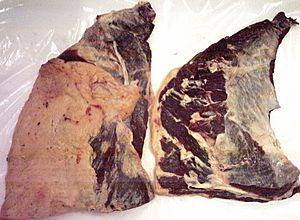Chelev facts for kids

Two pieces of flank steak. The left one is covered with a sheet of real chelev, the right one has only some non-kosher tendons (Krumim).
|
|
| Halakhic texts relating to this article | |
|---|---|
| Torah: | Leviticus 7:23-25 |
| Mishneh Torah: | Maachalot Assurot 7:5 |
| Other rabbinic codes: | Sefer ha-Chinuch mitzvah 147 |
Chelev (Hebrew: חֵלֶב, pronounced kheylev) is a special kind of animal fat that the Torah (the first five books of the Hebrew Bible) tells Jewish people not to eat. This rule is found in the book of Leviticus 7:23.
Only the chelev from certain animals is forbidden. These are animals that could be used for special offerings in the Tabernacle (a portable temple used by the Israelites) or later in the Temple in Jerusalem (Leviticus 7:25). The rule about not eating chelev is also one of the 613 commandments that, according to Jewish tradition, were given to Moses on Mount Sinai.
What the Hebrew Bible Says
The Bible clearly states this rule:
Speak unto the children of Israel, saying: Ye shall eat no fat, of ox, or sheep, or goat. And the fat of that which dieth of itself, and the fat of that which is torn of beasts, may be used for any other service; but ye shall in no wise eat of it.
—Leviticus 7:23-24
This means you should not eat the fat from oxen, sheep, or goats. However, fat from animals that died on their own or were killed by other animals could be used for other things, but still not eaten.
The Word "Chelev"
In Biblical Hebrew, the ancient language of the Bible, the word for fat is chelev (חֵלֶב). This word first appears in the Bible when talking about the "fats" from Abel's offering. Abel was one of the first sons of Adam and Eve.
Most often, chelev refers to the fats from animal sacrifices that were burned on the altar in the Tabernacle or Temple. The same word is also used in the phrase "the fat of the land." This phrase means the richest or best part of the land.
 | Calvin Brent |
 | Walter T. Bailey |
 | Martha Cassell Thompson |
 | Alberta Jeannette Cassell |

